Chart of the Week: 86% of B2B marketers have used content marketing to achieve brand awareness goals in the last year
B2B marketers are successfully using content marketing to achieve top-of-the-funnel goals, with 86% saying they have used it to achieve their brand awareness goals in the last 12 months.
New research from the Content Marketing Institute (CMI) has revealed that content marketing is helping 79% of marketers to educate their audiences while 75% are successfully using it to build credibility and/or trust. However, fewer marketers are managing to make the most of content marketing when it comes to actions deeper in the funnel.
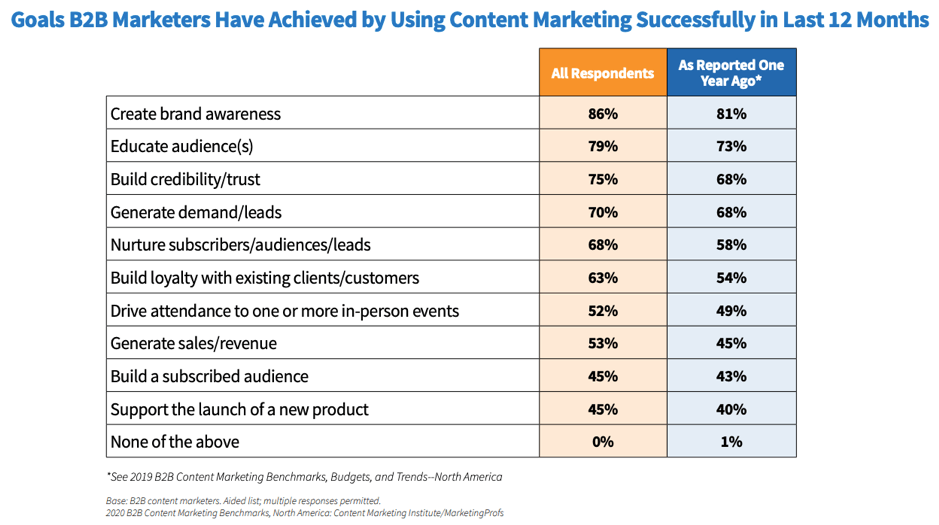
According to the 2020 B2B Benchmarks, Budgets and Trends report, just 63% are managing to use content marketing to build loyalty with existing clients or customers, suggesting they could be missing out on a higher retention rate. On top of this, just over half (53%) manage to use content to generate sales and only 45% are managing to build subscribed audiences through content.
Even though many marketers are not seeing better results across a number of goals, performances have improved compared to last year, suggesting that content marketing strategies are becoming more effective. Despite this positive, many marketers still have work to do when it comes to building lasting relationships with their audiences and delivering bottom-line results.
Those marketers who rate their content marketing success highly are more likely to successfully build these relationships and achieve the three goals that marketers are largely struggling with.
Content marketing success
The figures this year in terms of how B2B marketers rate their organizations' success with content marketing are fairly similar to those reported for the last three years. Most marketers (58%) say their companies are “Moderately Successful”, with just 21% saying they are “Very Successful”. A very small amount (5%) say they are very successful, showing that there is still plenty of work to do.
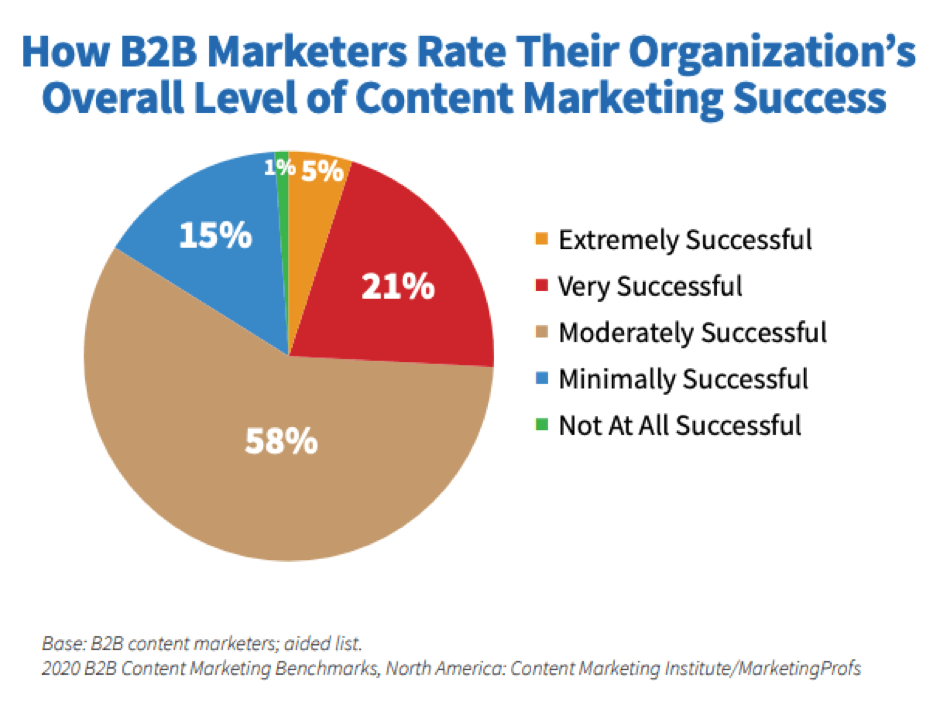
Worryingly, 15% of respondents say they are “Minimally Successful” and 1% say they are “Not At All Successful’. Although these figures are reasonably small, they show that many organizations are still failing to implement content marketing as part of their strategy, despite it being a core strategy for a number of years.
Despite there still being some companies that are still not delivering, on the whole, most marketers feel their organizations have improved their content marketing success levels. Over half (51%) say their companies are “Somewhat More Successful” with content marketing than they were a year ago.
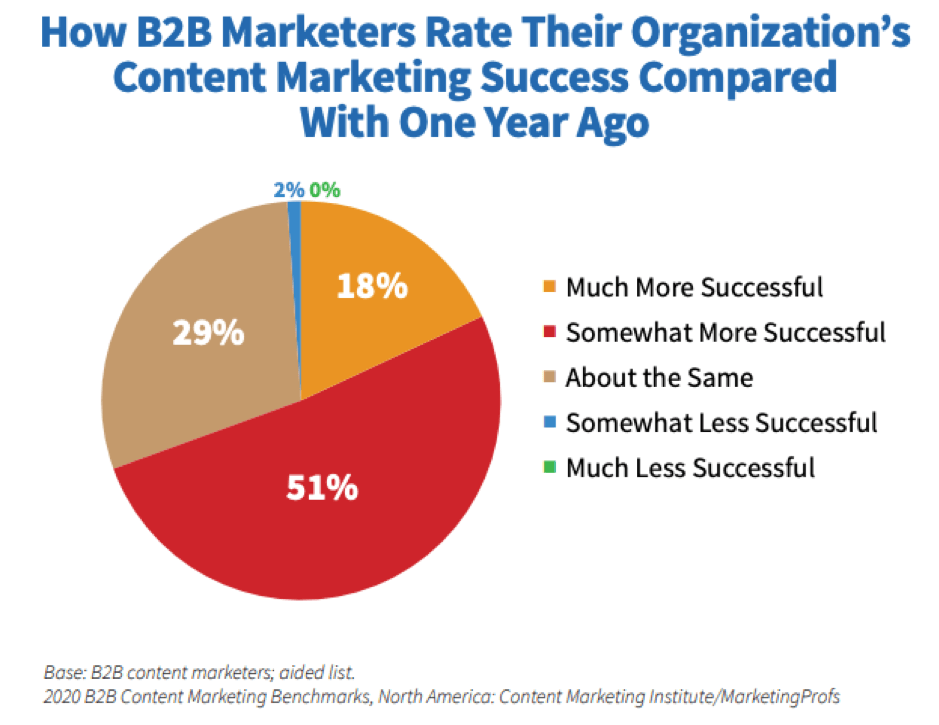
A further 18% have seen good improvements to their efforts, with these saying their content marketing is “Much More Successful” than they were this time last year. Just under a third (29%) said their success was “About the Same”, suggesting that they are still not achieving their content marketing goals.
A small 2% said they were “Somewhat Less Successful”, which could be a result of increased competition in their niches or a failure to update and evolve their content marketing strategies in order to remain competitive.
Content marketing maturity
Overall, though, the results are positive, with a third (33%) saying their organization is in the mature phase of content marketing maturity, which means they are finding success but are still challenged with integration across the company. A smaller 9% class their organization as “sophisticated”, with the company providing accurate measurement to the business and scaling content efforts across the organization.
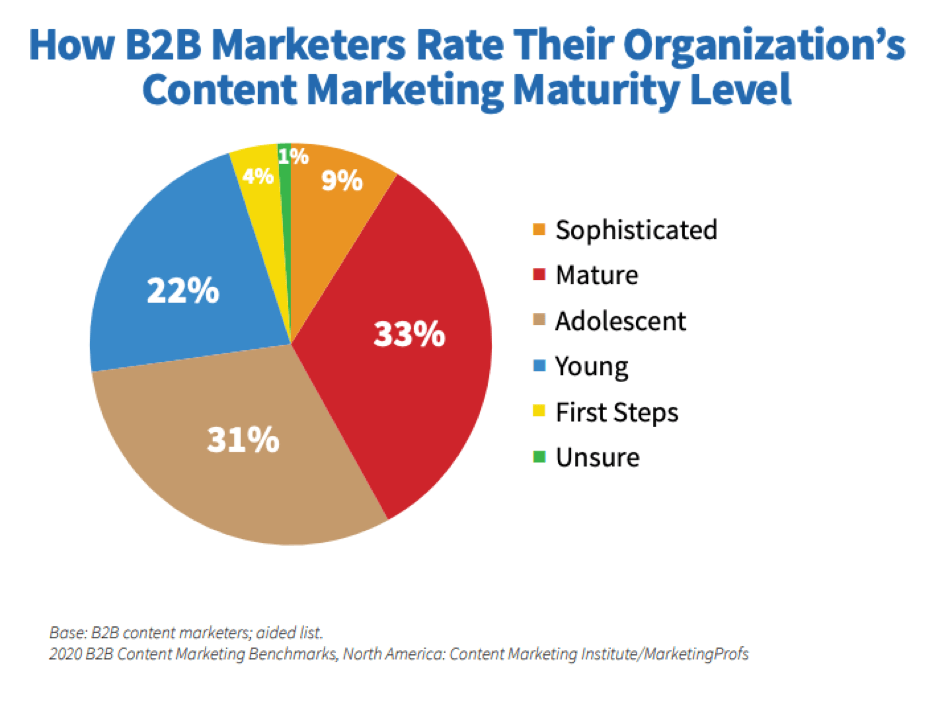
Just under a third (31%) reported that their organization is in the adolescent phase of content marketing maturity and are seeing early success while becoming more sophisticated with measurement and scaling. This shows that most companies are moving in the right direction with their content marketing efforts.
On the lower end of the scale, 22% class their companies’ efforts as “young”, as they struggle with creating a cohesive strategy and creating a measurement plan. A further 4% are only in the first steps stages of content marketing maturity, with their business doing some aspects of content marketing but without having a full process in place.
Documented content strategies
Despite many marketers marking their organizations as being fairly mature when it comes to content marketing, only 41% of respondents have a documented content marketing strategy. This is only a 3% increase compared to 2019’s report.
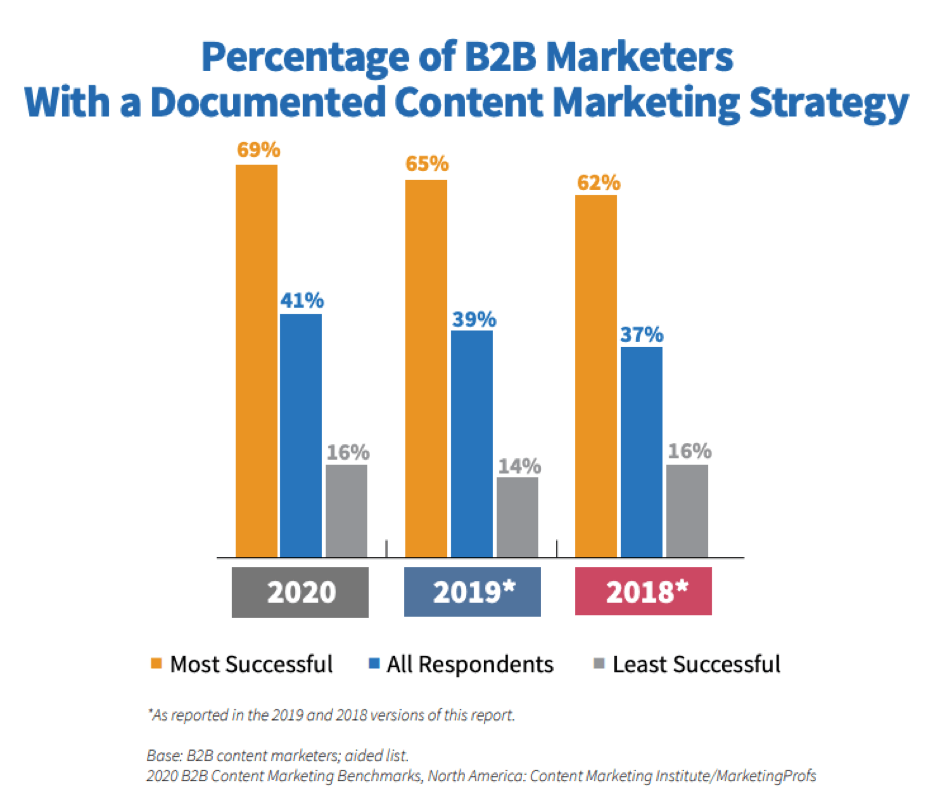
When split into the most and least successful marketers in terms of achieving content marketing goals, there is a very big difference. Of the most successful respondents, 69% have a documented content strategy compared to just 16% of the least successful marketers.
This suggests that having a documented strategy could be a big part of achieving your organization's goals with content marketing. After all, understanding who your target audiences are, the types of content you need to produce and when, as well as how you are measuring success are all important parts of getting content marketing right.
Providing optimal experiences
Over half (52%) of respondents overall agree that their organizations provide customers with an optimal experience across their engagement journey. This means that, on the most part, marketers are managing to deliver the right content at the right time.
Once again, the picture is slightly different when you split the most and least successful marketers, with 83% of the most successful saying their organizations manage this compared to just 23% of the least successful.
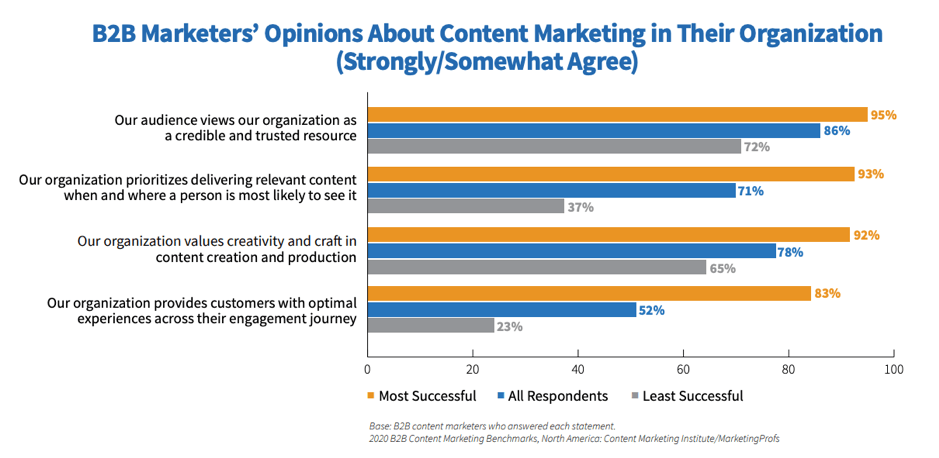
A further 71% say their organization prioritizes delivering relevant content where and when a person is most likely to see it (93% most successful versus 37% least successful), which will help to improve the customer experience offered. This also shows that many organizations are considering content placement across different channels, rather than simply focusing on their website.
The report also showed the importance in creativity within the B2B industry, with 78% of marketers saying their organization values creativity and craft when creating content. The results for this question were fairly high across the board, with 92% of the most successful marketers and 65% of the least successful marketers agreeing. This could be a result of audiences wanting more from B2B content marketing than traditional dry content.
All of these findings resulted in the vast majority (86%) of marketers agreeing that their organization is viewed by their audience as a credible and trusted resource, showing the power of content.
Technology and content marketing
When it comes to the technologies that B2B marketers are using to assist with the delivery of their content marketing efforts, analytics tools like web analytics and dashboards were top of the list. A total of 86% of respondents across the board use these tools, showing the value in data when crafting relevant and targeted content.
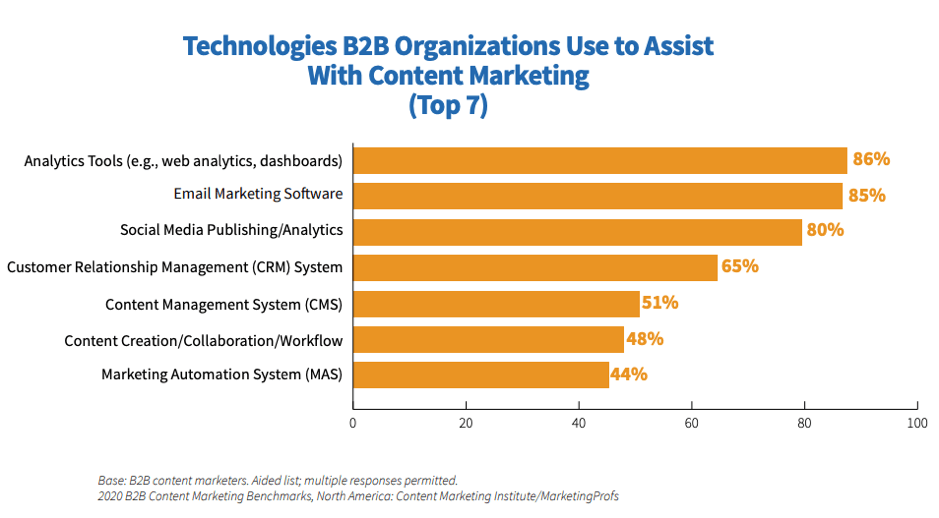
Email marketing software was up next, with it being used by 85% of respondents. This isn’t all that surprising when you consider the high ROI that email marketing can offer and the fact that email can help deliver content to a segmented audience, ensuring it is relevant.
Social media publishing and analytics technologies were also high on the list with 80% of respondents using them. Other popular options included customer relationship management systems (65%), content management system (51%), content creation/collaboration/workflow technologies (48%) and marketing automation systems (44%).
Lesser used technologies to help with content marketing included content distribution platforms (33%), content optimization (24%), content performance/recommendation analytics (22%), digital asset management systems (20%) and integrated content marketing platforms (10%).
Content marketing outsourcing
Exactly 50% of all respondents outsource at least one content marketing activity with large companies of 1,000 or more employees being more likely to outsource.
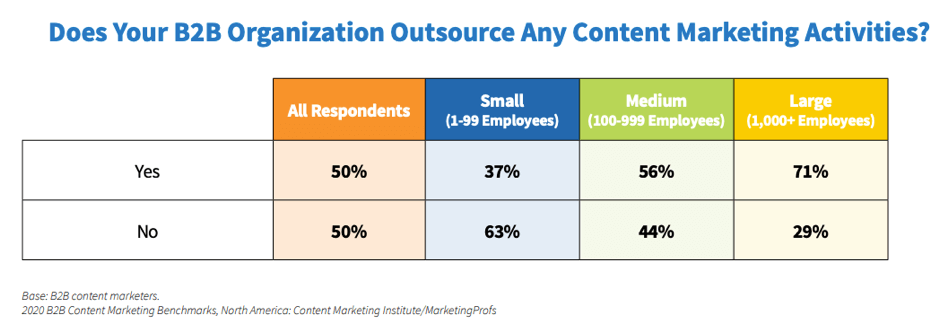
Some 71% of B2B marketers from large organizations say they outsource compared to just 37% of small companies (with one to 99 employees). While this difference is highly likely to be driven by a difference in budget, it also shows that there may be more learning opportunities for content marketing professionals in smaller companies as they will likely need to be involved in many different aspects of content creation.
When looking at different content marketing activities, it is the content creation itself that is most likely to be outsourced, with 84% of respondents saying this is the case. This makes sense when combined with the fact that only 13% outsource their content strategy, showing that organizations want to keep control of the strategy side of things but leave the creation of content to external experts.
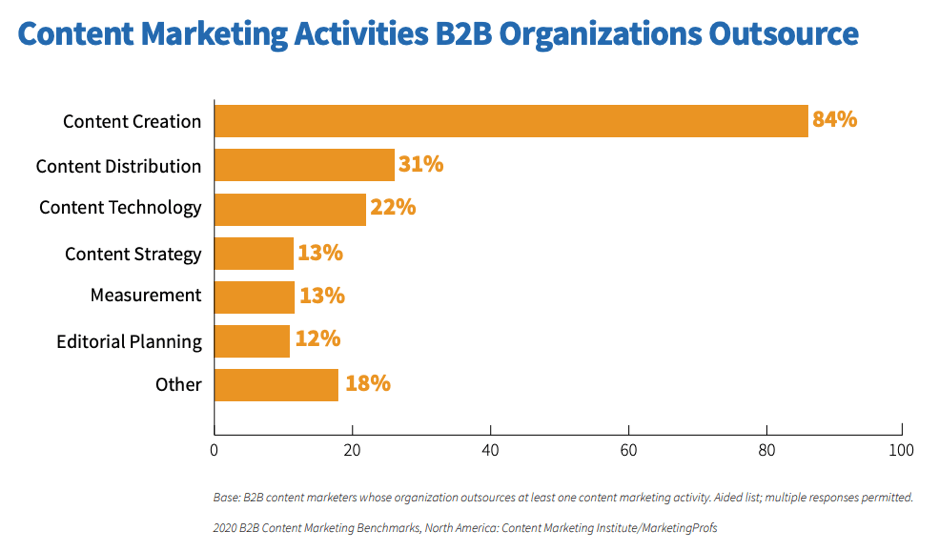
Under a third (31%) of respondents outsource the distribution of their content while measurement (13%) and editorial planning (12%) are also largely kept in-house.
Content creation
When it comes to content creation, accuracy is the most important thing for B2B marketers. A total of 92% of respondents said that fact-checking content to ensure accuracy is something that they always or frequently take into account when creating content for their organization. Broken down, 95% of the most successful and 81% of the least successful marketers agreed with this.
As content can help build trust and foster a relationship between the customer and company, ensuring the accuracy of content is hugely important. Giving incorrect information can easily undermine trust and lose companies' business.
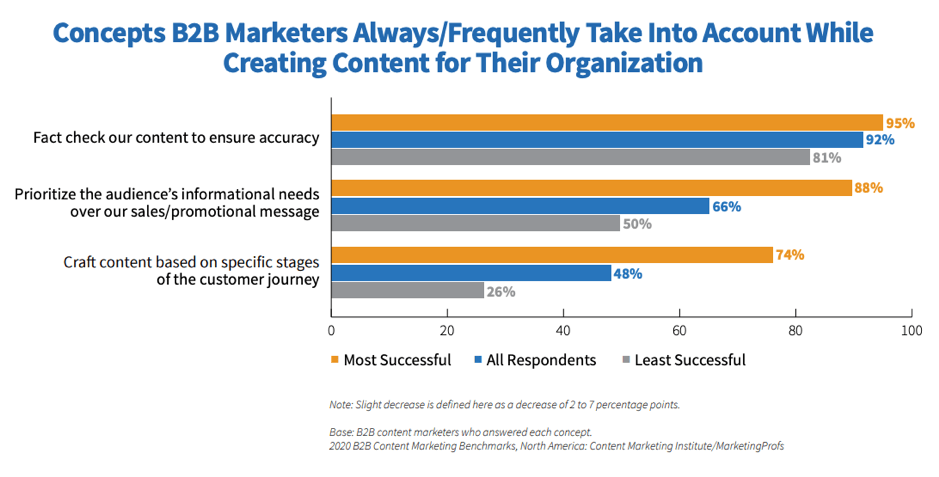
Most marketers also see the value in providing content that prioritizes the information required by the audience over their company’s promotional messaging. Some 66% of all respondents agree with this (88% most successful versus 50% least successful), once again showing that content marketing is key for trust-building, which can ultimately lead to sales.
However, fewer marketers are creating content for the different stages of a customer journey, with just48% saying they do this (74% of most successful versus 26% least successful). This can mean that they are failing to answer questions or alleviate pain points at different stages of the customer journey, which can stop organizations from being successful at leading customers through their marketing funnel.
Although organizations aren’t addressing the customer journey stages with their content, they are producing content for various audiences. On average, 50% of marketers create content for two to three audiences.
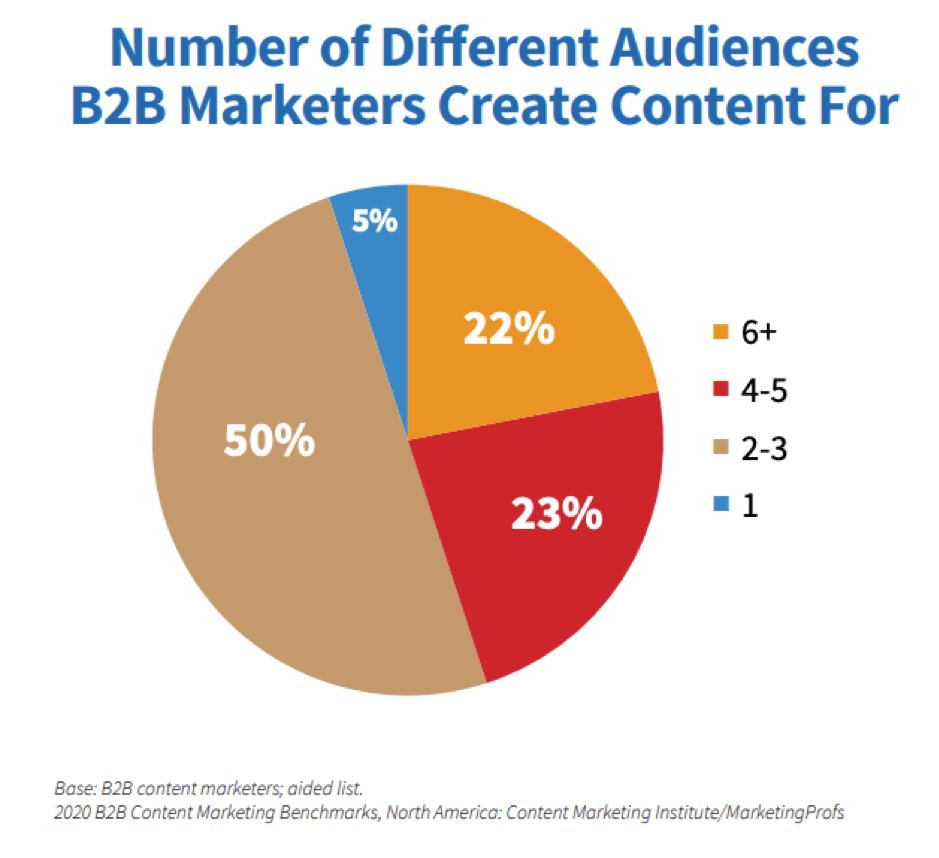
Positively, only 1% of respondents are only creating content for one audience, showing that the majority of marketers are seeing the benefits of personas and a target content marketing strategy.
Types of content
Most of the content created for content marketing purposes over the last 12 months has been designed to generate awareness and/or interest. Half (50%) of the content created in the last year by B2B marketers was for the top of their marketing funnel.
In comparison, only 11% of content was created for post-sale purposes, such as creating brand loyalty of advocacy. When you consider the fact that customer acquisition is up to seven times more expensive than customer retention, you could argue that this is fairly short-sighted. As customers are already engaged enough to buy from your organization, it is worthwhile creating more content aimed at maintaining that engagement and increasing customer lifetime value.
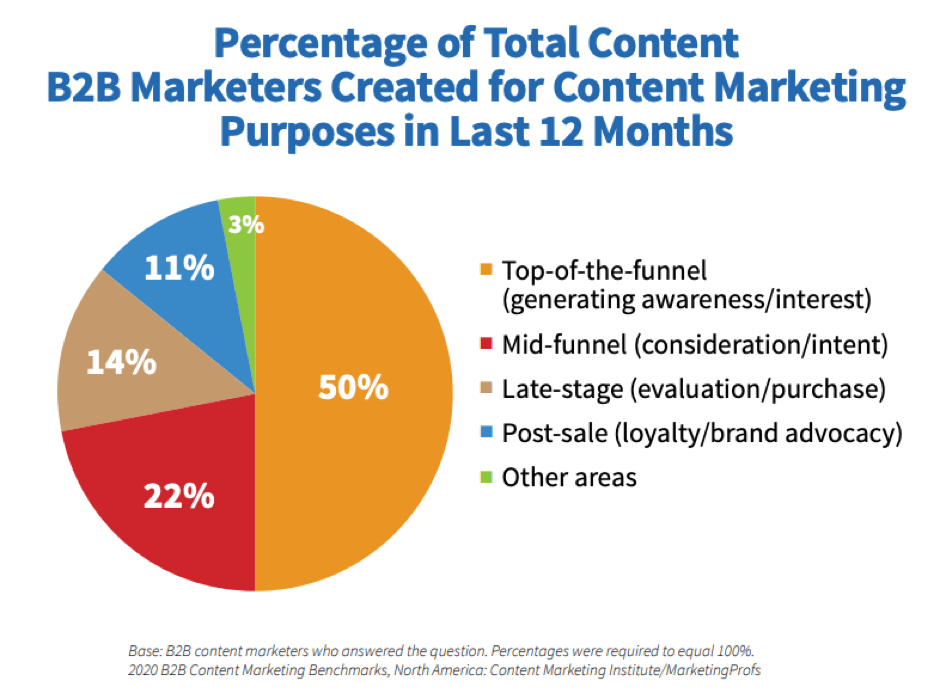
When looking at the content types used by B2B marketers in the last 12 months, there is a lot of variation. As expected, a large majority (95%) of marketers made the most of social media content, which is key for increasing brand awareness. Some 89% also created blog posts and/or short articles, which are suitable for sharing across various channels.
Surprisingly, considering the higher level of information usually required by a B2B customer before making a purchase, only 38% of respondents produced long-form text and just 34% created research reports. These forms of content can help showcase your company, make you more competitive but also provide content that gets shared more, providing a greater level of brand awareness.
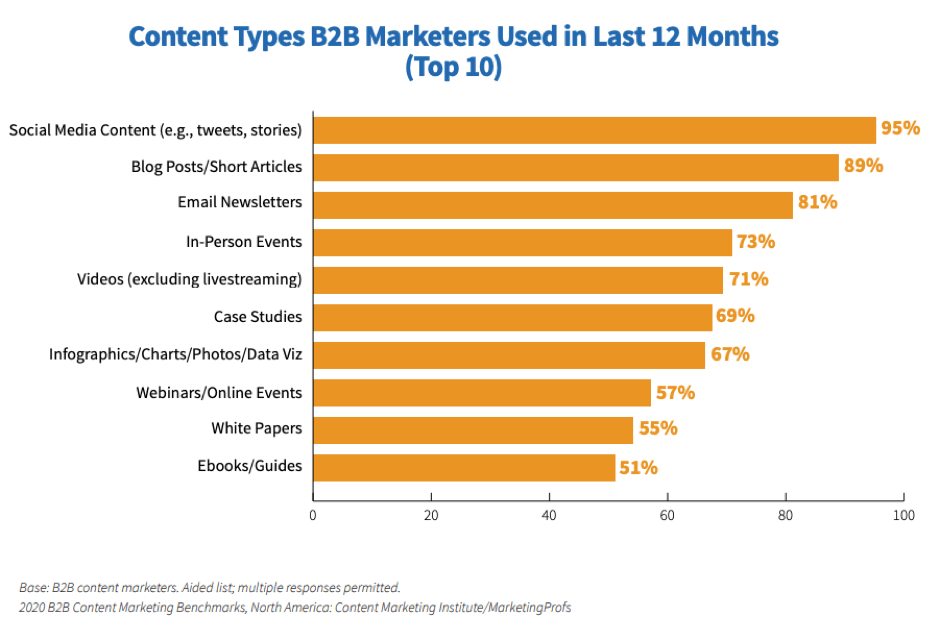
A good number (71%) have used video in the last year - although just 10% opt for live streaming. As 72% of people say they’d rather use video to learn about a product or service than text, video content can offer B2B marketers a huge number of benefits and leads. If you’re considering creating B2B videos, it’s important to consider the fact that 87% of business-related views still take place on desktops or laptops, which means that mobile formats may not be the best option.
Final thoughts
While content marketing is key when it comes to building awareness, marketers need to remember that it should also be used throughout the rest of the funnel. Content helps to inform customers and can help you integrate all areas of your funnel, making it easy to move people from awareness through to purchase.
However, content isn’t just all about awareness and purchases, it is also a big part of brand advocacy and customer loyalty. Marketers are still failing to focus on existing customers with their content, meaning they are likely missing opportunities to increase customer lifetime value.
Fully assessing your existing strategy – not to mention documenting your strategy – can help you see where the gaps and opportunities lie. This will ensure you can create a fully rounded content marketing strategy that delivers content at the right time via the right channels to the right audiences.
For more insights into B2B content marketing, take a look at the CMI’s full report.




























